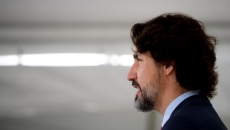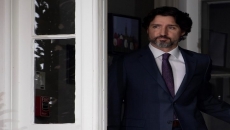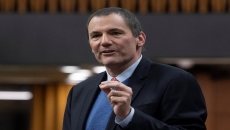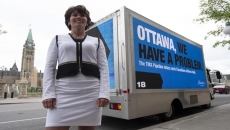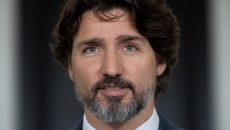The federal government is planning to spend $650 million more to help Indigenous communities cope with the pandemic, after months of First Nations, Inuit and Metis leaders saying the previous amount was inadequate.
Prime Minister Justin Trudeau says $285 million of this will support rapid public health responses in Indigenous communities when faced with an outbreak of COVID-19.
"These funds will go toward more nurses, will help procure specialized supplies and will support work with First Nations, Inuit and Metis communities on continued community-driven responses," Trudeau said Friday outside his Rideau Cottage residence.
The federal government had previously committed $305 million to help First Nations reserves, and Inuit and Metis communities, with supplies, medical care and facilities to allow for physical distancing.
Since that initial funding was announced in March, Indigenous leaders from across Canada have said it would not be enough to prevent the most vulnerable people from falling through the cracks.
National Chief Perry Bellegarde of the Assembly of First Nations applauded the new investment Friday, saying he had once again urged Trudeau to do more during a recent conversation.
"Today, (Indigenous Services) Minister Marc Miller and Prime Minister Justin Trudeau made the necessary commitments to help ensure no one is left behind," Bellegarde said in a tweet.
Although the first wave of COVID-19 appears to be receding, the threat of a second wave is real and Indigenous communities continue to be among the populations most vulnerable due to long-standing health and social disparities in their communities, Miller said.
"The federal government has a direct responsibility to provide direct health care in some First Nation communities and these funds enable us to live up to our obligation to provide quality care and support them, especially so in times of crisis," he said.
The money announced Friday will also go to some of the most vulnerable individuals and families who rely on the on-reserve income assistance program, so they don't have to choose between food and rent during the crisis.
The program will see a $270 million increase overall, with $139 million of this funding going toward direct COVID-19 response, and the remainder going toward sustaining base funding for this program to ensure continuity for its clients through the crisis.
"Our collective goal is to make sure individuals and families can go through this pandemic with the most support that they can get — that they can face this new reality with as little stress and anxiety as possible when it comes to their income and that they can, first and foremost, stay safe and healthy," Miller said.
Since the pandemic began, groups and shelters that work with Indigenous women have reported a sharp rise in domestic violence as COVID-19 restrictions keep families in their homes.
To address these concerns, Miller announced Ottawa will spend $44.8 million over five years to build 10 shelters in First Nations communities and two in the territories to help women and children fleeing violence.
The government will also provide $40.8 million to support operational costs for these new shelters over the first five years, and $10.2 million annually after that.
Ottawa is committing a further $1 million a year for engagement with Metis leaders and service providers to provide shelter to women fleeing violence and assist in community-led violence prevention projects.
"No one should have to stay in a place where they are unsafe, no one should be forced to choose between violence or homelessness," Trudeau said.
"These new shelters will offer a path forward when people need it most."

